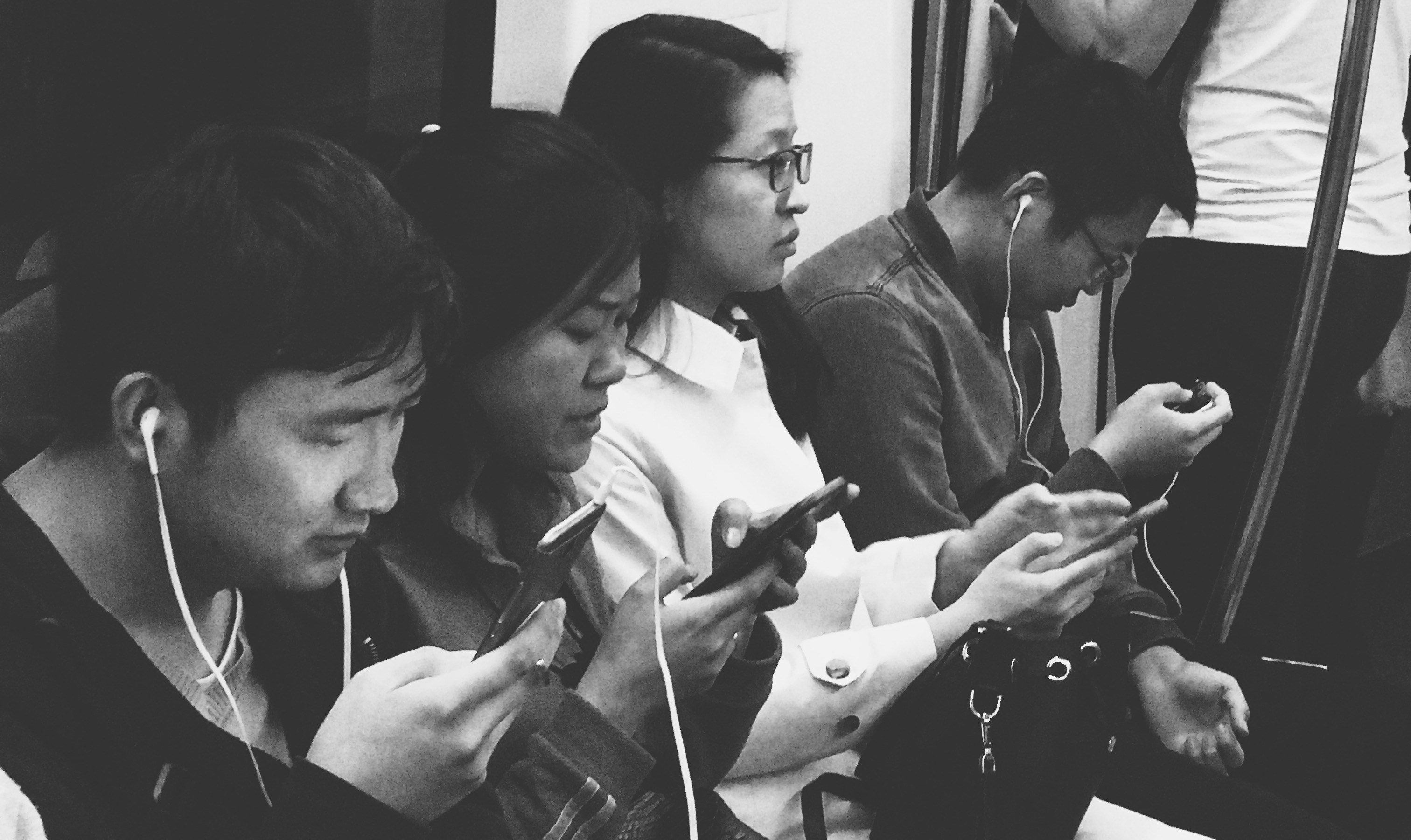It’s my 13th #AtoZChallenge in China entry — and yes we’re halfway to the finish line! In today’s entry we focus on the “mobile-ness” of a country that imposes rules on the internet.
I took that featured image several days before this post. It shows people completely glued to their mobile phones. It’s completely a normal sight on the subway here… as is in other countries.
In my previous post about the Great Firewall of China, I explained China’s strong “e-cosystem,” or the booming and thriving internet culture behind the cyber-shield. A a state newspaper calls this a “system [quelling] Western intentions to penetrate China ideologically. Is it effective? Not that really. There are ways to penetrate that system. And Western soft power still goes through the cyber-shield in the form of major brands and pop culture shown and heard on mobile.

M is for Mobile Communications
China, with over 700 million people wired and connected by the internet [1], makes it a lucrative mobile behemoth for both local and Western brands. Moreover, 92.5 percent of those people access the internet via mobile phones in 2016.
That industry is particularly a hit, making e-commerce, mobile communications, and mobility such an essential part of daily living of an average Chinese in big cities such as Beijing. (For more about that, stay tuned for the Home and Relocation Guide issue of beijingkids magazine where I discussed some of the most must-have apps for expats in Beijing).
When I wrote an article about setting up Alipay for our magazine, a Chinese colleague and I had talked about the ease of the app for paying everything — from household stuff to travel and commuting to entertainment. WeChat introduced its Wallet feature, somewhat a similar but limited version of Alipay. But the one thing that separates the two is that WeChat is integrated into the app itself, meaning, a user doesn’t need to exit the app just to pay something. With the advent of mobile banking, my colleague said that China has leapfrogged the use of credit cards and became a cashless society.
And it’s just mobile payment that we’re talking about. Mobile communications are in a parallel universe. Gone are the days of slow talk in China; nowadays it’s fast — from voice messages to live streaming — there’s no way to not respond quickly because everyone is online. But so quickly that mobile communications are slowly becoming the life of many Chinese millennials.
One of the effects?
https://www.youtube.com/watch?v=b4uocBKzelU
And in a more tragic story…
In fact, in 2008 psychologists in China classified internet addiction as a clinical disorder. It’s such so ironic that a country where information is either suppressed or blocked was the first worldwide to consider internet addiction as a threat to teenagers. To curb that, several Chinese provinces have set up military-style “treatment” camps for young internet addicts, with some providing shocking rehabilitation while others a controversial and fatal therapy.
Unleashing Inner Superstars in Chinese Mobile Communications
Indeed, how Chinese use the internet is, I must say, mystifying. Never did I see a subway train with passengers not holding a phone — as many of them do their thing, from live streaming their nauseating babbles, messaging via WeChat, watching videos on iQiyi and other video streaming apps, or listening to their pods. My supervisor said she uses her commuting time to respond to WeChat messages and emails (which I also do too, haha!).

Many Chinese friends whom I asked why they use their phones very often said: (1) it’s a way to detach from the hassle of living in the city; or (2) they feel empty and using mobiles help them forget that emptiness. It’s a reality that I think is present everywhere. But in China, it’s a notch higher. When they detach from reality or fill that emptiness through mobile connections, they assume a different and fanciful persona with over-the-top stuff on their social media statuses or their narcissist superstars unleashed via the streaming craze.
A few weeks ago, I joined a seminar about online marketing where a supposedly famous Chinese key opinion leader (KOL) was invited to give a speech about empowering through social media. Her several minutes of presentation focused on how she “empowers” Chinese girls through live streaming her makeup tutorials and attending to her followers’ feedback and queries. But I just found it hollow and completely vain. It’s like “Me, Myself, and I” portion of promoting her brand.
Is it bad? Of course, I’m no expert to say everything these people do is wrong. Taking it on a scholarly point of view, however, I must say Chinese are revolutionizing the way mobile communications are used. We know that outside the Great Firewall, the internet has been used for revolution and propaganda as well as knowledge and ignorance. But in China, it’s a combination of everything, and that makes it thriving and interesting to follow.
Thanks for reading this entry. On Monday’s #AtoZChallenge, we say hello to Adele’s smash hit!
[1] Source: Time Out Beijing magazine
See more of my #AtoZChallenge: Chinese Adventure

Well that was really interesting. I always wondered if other people were as addicted as in the US, especially (like you said) in countries where information is restricted.
Doree Weller
I know, that was also my first thought when I came here. And isn’t it surprising that China is the first country to say that internet addiction is a clinical disorder? Haha
Wow, that’s fascinating. I think we’re addicted to mobiles in the west but really it’s not this bad. Plus I live in Cornwall and the signal is terrible so it’s harder to be permanently glued. Young people are the same everywhere though
You’ll be surprised how regular Chinese in Beijing use their phones. They’re too hooked on that sometimes I find it strange how they can walk straight or go upstairs without falling haha!
Pingback:#AtoZChallenge in China: Virtual Private Network – coolkid
Pingback:#AtoZChallenge in China: Zàijiàn (See You Again) – coolkid